'I don't want to have regrets.' USC's Lincoln Riley tries to balance family and football
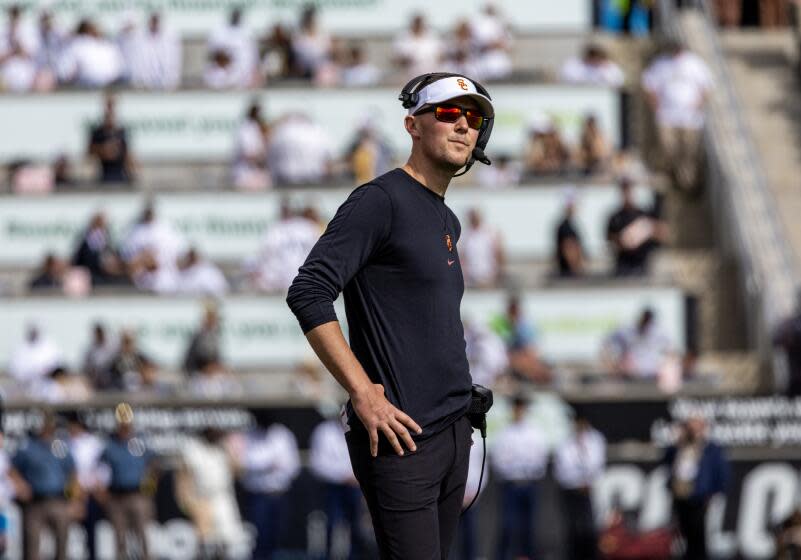
On the night of his 40th birthday, Lincoln Riley left his USC office late, as he does most Tuesday nights during football season. By the time he reached his Palos Verdes home, he was ready to turn in early.
The coach’s birthday always came at an inopportune time — Sept. 5, just as football season was in full swing. There wasn’t much his family could do to celebrate with his schedule, so Riley had gotten used to low-key birthdays.
He didn’t expect anything different last month when he turned 40.
The past two years left Riley thinking more about life and what was important. So much had changed for his family since November 2021, when the Rileys left Oklahoma, enraging an entire state in the process. They loved their new world at USC, where his Trojans are preparing for a major litmus test Saturday in South Bend, Ind. The Southland afforded them relative anonymity, but “the transition from Oklahoma wasn’t as easy, I think, as we’d hoped it would be,” says Clarke Stroud, USC’s director of football operations and a close friend of Riley's.
Soon after the Rileys moved, Dave Nichol, a USC assistant coach and another close friend, was diagnosed with cancer and died within three months. By the end of the year, the coach and mentor who gave Riley his first break as a coach, Mike Leach, died suddenly from complications of a heart condition. Losing both men, each so crucial to Riley’s rise, rocked him. But USC, in the midst of a rapid rebuild, needed Riley to project confidence. So he kept those feelings close and pushed forward.
My heart is broken.
I met Dave Nichol in 2002. He gave me my shot to be a college player and coach. Taught me everything. Safe to say I wouldn’t be here today without Dave.
1 of the best/most unselfish people ever. Love you & miss you brother-
RIP🙏 pic.twitter.com/Arb3bFMO0J— Lincoln Riley (@LincolnRiley) March 26, 2022
“He had this really unique ability to keep everyone focused,” Stroud said. “But privately, I had never seen him like that. It was a really, really difficult time for him.”
He emerged from that stretch with a different perspective, Riley said. One that was only further cemented last month on the night of his 40th birthday.
Before Riley went to bed, his wife, Caitlin, told him she had a surprise. She’d compiled a video of people wishing Riley happy birthday.
In the video, friends, family, fellow coaches and former players from Texas Tech, East Carolina and Oklahoma wistfully reminisced about their favorite moments with Riley. High school buddies from Muleshoe, Texas, poked fun at his age. Garrett Riley, his younger brother and Clemson’s offensive coordinator, poked some more. Former Oklahoma coach Barry Switzer and his wife, Becky, recorded a particularly memorable video, wishing him well. Some clips were funny, others heartfelt. As he watched, Lincoln Riley was struck by how many friends he hadn’t talked to in a while — and the particular memories they held closest.
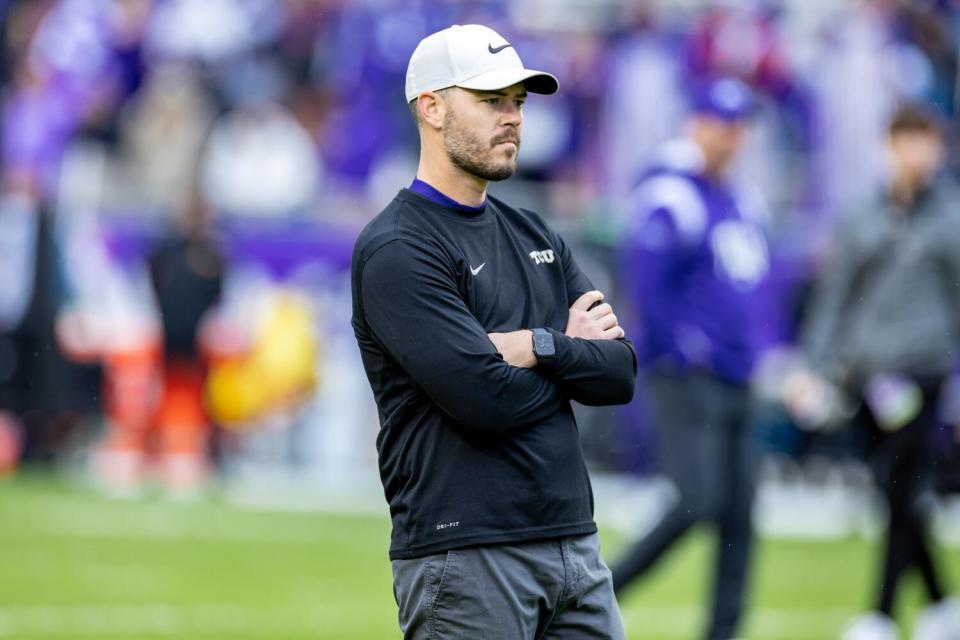
“Not one of those videos was talking about winning games,” Riley said.
The Rileys hadn’t planned to watch the whole video. But they sat there, just the two of them, playing it for the full hour-plus runtime. “One of the coolest gifts I’ve ever gotten,” Riley said.
It was a reminder not only of why he coaches, but how his perspective about the job had shifted over time. Riley never fixated on legacies or what he might leave behind, not even in his early, most ambitious days. He didn’t dream of his statue outside of a stadium or his name at the top of any record books. His goals as a coach hadn’t really changed much. But since losing Nichol and Leach, Riley had been thinking more about what it meant to live a fulfilling life. He wondered what life might hold for him one day after coaching.
Maybe it was the milestone birthday that made him sentimental, he concedes.
“I’m sure everyone that’s turned 40 can relate,” Riley joked.
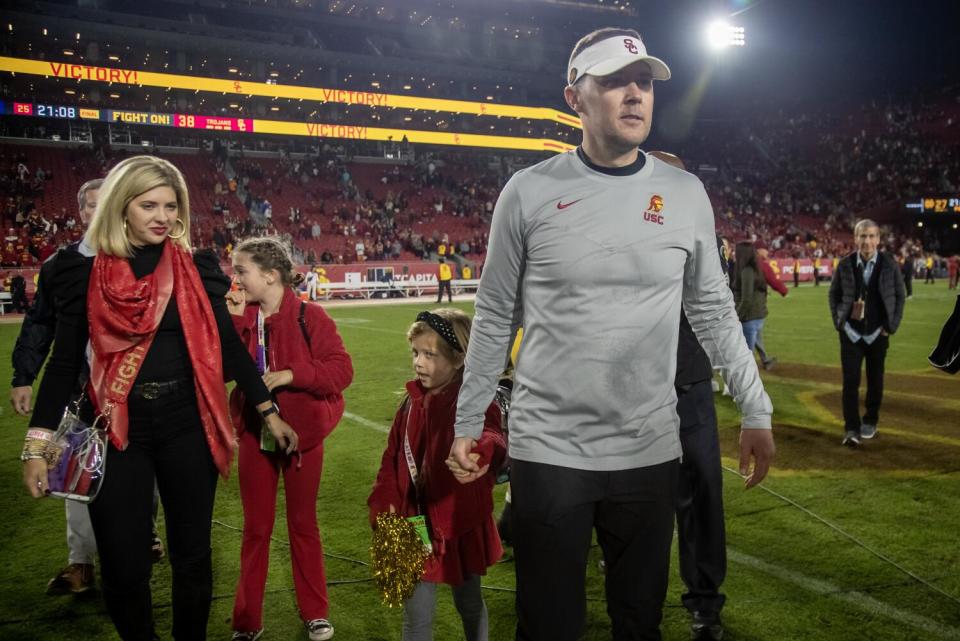
Or maybe his time as a coach really does have an expiration date, even if that day isn’t coming anytime soon. Maybe he’ll leave the game at 50, like he suggested in a recent interview. “Or who knows?” he told The Times. “Maybe I’ll coach until I’m 65.”
He’s still sorting through those feelings.
“I know right now, there are things I want to do,” Riley said. “I don’t want to have regrets when I’m done, at the end of my life. I do think about that. I just don’t want to have regrets, especially with anything that has to do with my family. It’s hard not to consider the possibility of starting over in life.”
When he first started on staff at Texas Tech, Riley had a singular focus: Make coaching a viable path for his future.
He certainly had the drive, working long hours for little pay to prove himself. Dave Nichol taught him many of the finer points of the profession at the college level. Nichol was the lead graduate assistant on Leach’s Texas Tech staff at the time, and he’d taken a liking to Lincoln when Riley was the Red Raiders’ cerebral walk-on quarterback. When Leach moved Riley to a student assistant role, Nichol showed him the ropes.
“They spent a lot of time together,” said USC receivers coach Dennis Simmons, who was also on the Texas Tech staff. “Dave was there for him to bounce ideas off of, to help him learn.”
He helped open doors, too. Riley quickly moved up the ranks at Texas Tech, becoming a full-time staff member by 24. He knew Nichol was part of the reason.
Read more: USC's Lincoln Riley on Dave Nichol: 'Owe everything to the guy'
“He invested in me as a young nobody,” Riley said. “It started a lifelong, great friendship with a lot of respect.”
The two of them “just had this simpatico,” Stroud said.
That came as no surprise with Nichol, who meshed with just about everyone. Often, Stroud said, he would tag along with fellow staffers on vacations, like a surrogate family member. “Dave was everybody’s brother,” he added.
Riley would work with Nichol again at East Carolina. And years later, when Riley was building his own staff at USC, he knew exactly whom to call to coach receivers.
The two friends were thrilled at the thought of a reunion. But Nichol had been on the Trojans staff barely a month when he mentioned he hadn’t been feeling well. They wondered at first if it might be a complication of Nichol’s Crohn’s disease.
We got our guys.#FightOn✌️ pic.twitter.com/fj237r6ody
— USC Football ✌️ (@uscfb) January 10, 2022
The cancer diagnosis landed like a gut punch. There was still hope that Nichol could recover, but the reality was they’d caught it too late. That fact would linger with Riley, who was later inspired to create an annual health check for USC coaches, encouraging them to take their health seriously.
Having just moved to L.A., Nichol was living alone in the USC hotel at the time of his diagnosis. As his condition began to decline, it became evident Nichol needed more regular care.
His family was thousands of miles away in Texas, so in February, Riley invited Nichol to live with him and his family in Palos Verdes.
Nichol initially refused. He was a proud man — he didn’t want to be a burden. But the Rileys, who had anticipated that response, were convincing. “We didn’t really give him much choice,” Lincoln said.
He’d treasure those six weeks they spent together.
“We had a couple moments to talk, just the two of us, when we both realized we weren’t going to have many times to do this,” Riley recalled. “So we said our piece and said our appreciation for one another. We had a chance to do a little bit of everything, which a lot of people, with someone they care about, don’t get that chance.”
His wife and daughters would keep Nichol company during the day. When Riley made it home, sometimes he reviewed film with Nichol, who, until his final days, kept asking Riley about the team.
Had the 1st annual Dave Nichol health check for our football staff today. Coaches have so often put their health off to the side. Our hope is that this starts a trend around the country to monitor these staffs & catch any issues before it’s too late.
We miss you Dave- pic.twitter.com/vbgdTtJioC— Lincoln Riley (@LincolnRiley) August 2, 2023
Riley wouldn’t trade that time for anything. But as he watched his friend’s health decline, day after day, those closest to him could see the emotional toll it exacted.
“To watch him go downhill as fast as he did was really, really hard on Lincoln,” Stroud said. “That was probably the most emotional I’d ever seen him.”
In late March, Riley had a sinking feeling. They’d set up a trip for Nichol to Texas so he could see his dad. Riley knew, deep down, there would be no return flight.
So before Nichol left, the Rileys invited friends and fellow coaches over to see him off.
“You knew that it was the last time you’d be around him,” Simmons said.
The tone that night was somber, but Nichol was in good spirits. As the sun set over Palos Verdes, the new USC coaches took a photo at Riley’s home overlooking the Pacific Ocean. In the center, with friends close by on both sides, Nichol looks content, grinning against a glowing backdrop.
He died on March 25, not long after his flight home to Texas.
The job didn’t allow Riley much time to grieve. His first spring practice at USC opened a few days earlier. There was still a program to rebuild. Even with all the challenges, Riley led the Trojans to an 11-3 finish.
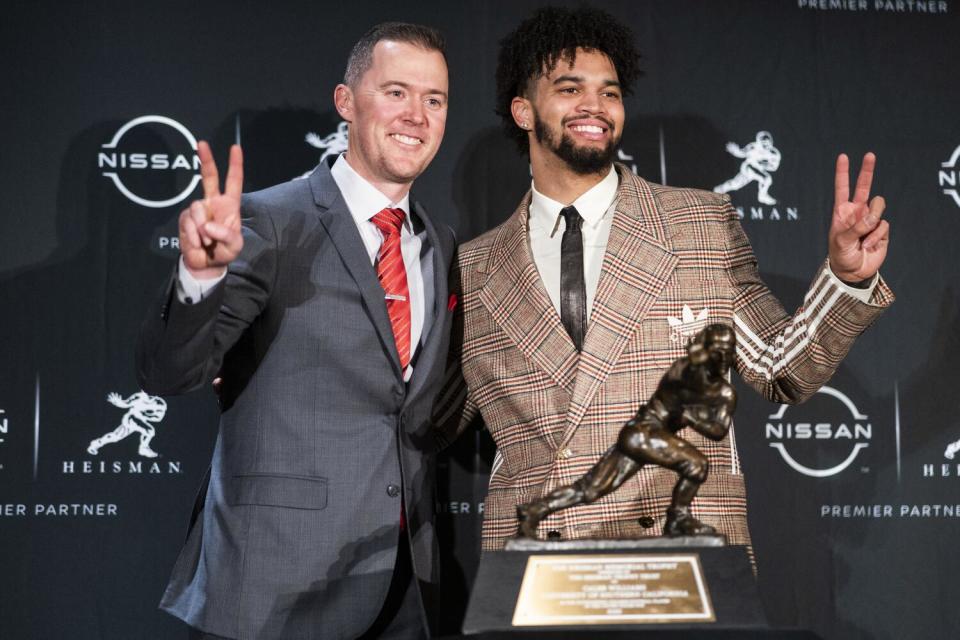
More loss followed: Not long after USC fell short in the Pac-12 title game, Leach died. Riley knew his mentor had been dealing with health issues, but he couldn’t wrap his head around the idea that Leach, just 61, was suddenly gone.
“Mike was one of those figures in my life that just seemed invincible,” Riley said. “It just kind of felt like he’d always be there.”
After his mentor's death, Riley watched as coaches, players and friends linked to Leach reconciled, resolving differences that still lingered from Leach’s ugly exit from Texas Tech years earlier.
It made Riley think back on his own start in the profession and how he handled certain relationships as a young coach. “It was kind of a little bit more of a scorched earth path with me,” he admits.
“Why did I give that my attention? Or why did I just not say, 'I’m sorry?' Or why was I not the one to reach out or to make things right? I was guilty of that in a lot of ways early on.”
Read more: Inside Lincoln Riley's Air Raid offense, known for constant evolution and misdirection
He thinks of Nichol and how valuable that time feels now. He talks about paying it forward.
“You only have so much time,” Riley said. “And he was so willing to give so much time and attention to me.”
Time, for any college football coach, is a precious commodity, one only growing more scarce by the season. Since the advent of the transfer portal, more and more weeks are crossed off coaches’ offseason calendars. The job is more staggering of a grind than ever, encompassing all but a few spare weeks out of the year.
After a taxing first season at USC, Riley's staff had barely 24 hours to shake off their Cotton Bowl collapse in January before potential transfers for the following year were on campus for visits.
“You used to try to plan your camps early in June, then you’d have some time off,” Stroud says. “You’d have July. You’d have right after the bowl game with some time to disconnect, some good time in February. But now, we’ve become just completely consumed. It just doesn’t stop.”
Riley knows there are fixes that could be made — primarily to the recruiting cycle — and he’s happy to talk about them. He doesn’t think the current commitment asked of college coaches is sustainable — not as mental health becomes more of a societal consideration. But Riley also knows the mental well-being of coaches is far down the list of priorities for fixing college football.

“As long as it’s like this,” Riley said. “I think we’ll see more and more people at least considering shutting it down a little sooner than they would 15 years ago.”
The coach already raised some eyebrows last month when he told journalist Graham Bensinger that his mind-set had been to retire at age 50. The deadline left some USC fans feeling anxious, but that “had always kind of been my stance,” Riley said.
Watching Bob Stoops walk away from coaching Oklahoma at 56 made an impression on him. He wanted to one day make that decision on his own terms, with his daughters and family front of mind.
“This job today has a lot of unique challenges, which I embrace and attack as best I can on a daily basis,” Riley said, “but there is, at times, that need, and I think Bob put it best, to have your own time and your families’ own time. It’s always going to be limited while you do this. I think there are other things I’m going to want to be.”
Riley said he has broached the subject of early retirement with more coaches than you might think — among them Rams coach Sean McVay, who has openly pondered walking away each of the past two offseasons.
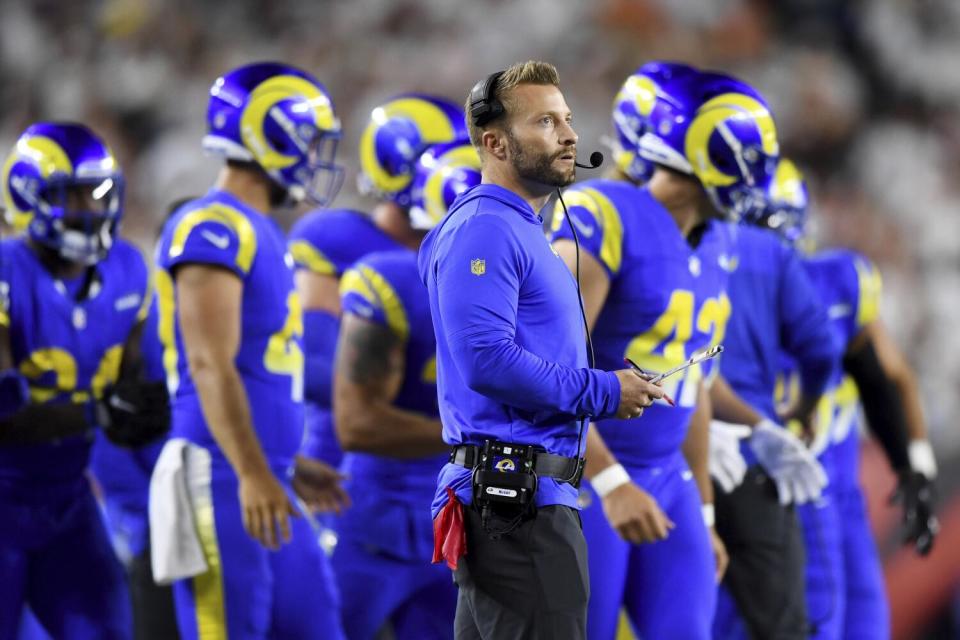
'I don’t want to have regrets when I’m done, at the end of my life. I do think about that. I just don’t want to have regrets, especially with anything that has to do with my family. It’s hard not to consider the possibility of starting over in life.'
USC coach Lincoln Riley on early retirement
“Sean and I have been able to have a couple good chats about it,” Riley said. “It’s good to have someone in town who’s going through some similar things.”
Still, Riley can’t help but envy his friend’s summer schedule.
“The guys in the NFL, their lifestyle is awesome in a lot of ways,” Riley said. “Once their season is done, life is a lot different than a college coach out of season.”
Riley still tries to get away when he can. Every summer since 2015, with the exception of the first year of the pandemic, Riley and his father, Mike, along with Stroud, Simmons and another friend, have rented a fishing boat in Cabo San Lucas. Nicknamed the “AO” — which stands for “Always Open” — the trip is a critical part of Riley’s self-preservation plans.
“Literally, we get off the plane, we go to the boat. We get off the boat, we go to the plane,” Stroud said. “There’s no cell service. We’re not down there to go to dinner or go to the beach or anything like that. Lincoln makes a big, giant playlist. We all send him some of our suggestions of what we want to hear, and we just fish for three or four days and disconnect.”
Then it’s back to the grind of the season, the recruiting cycle, the transfer portal and everything in between.
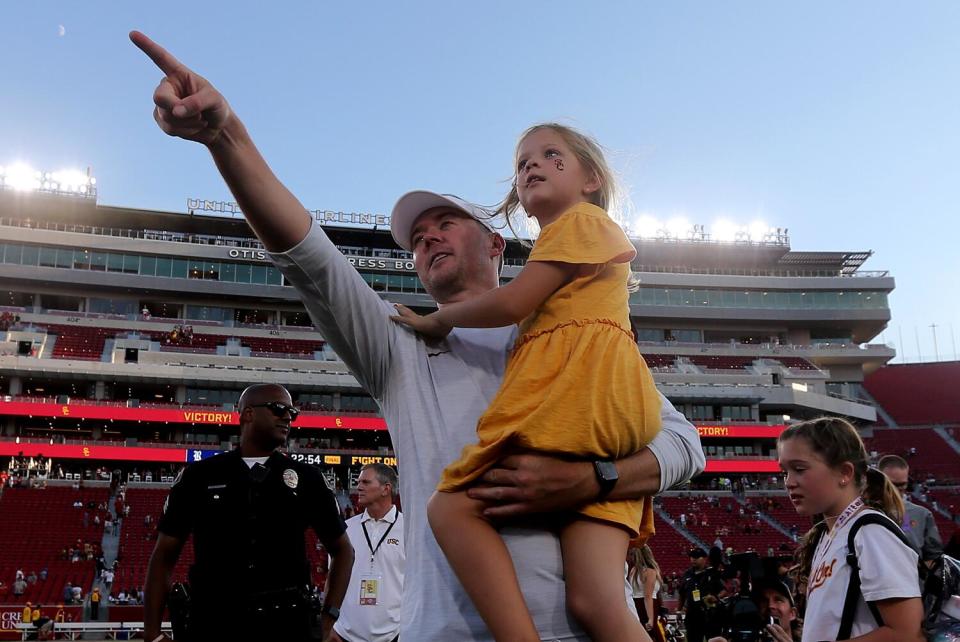
At some point, perhaps that won’t be the plan. “He’s always articulated to me that he doesn’t want to be an old man coaching,” Stroud says.
Riley is still far too competitive to seriously consider that now. He still searches for ways to increase his efficiency, even twice this year requesting Stroud find him a new parking spot on campus to cut a minutes-long walk down to seconds.
Riley understands, now more than ever, how valuable that time is. Asked what he wants to be remembered for when his career finally comes to a close, there’s no mention of wins or accolades. He thinks about the video Caitlin made, how barely anyone in it dwelt on football.
“It was all just about the memories and the laughs and the time together, the appreciation of one another," he said. "That’s the stuff that’s more along the lines of what matters.
“I hope that’s something they always remember.”
This story originally appeared in Los Angeles Times.

